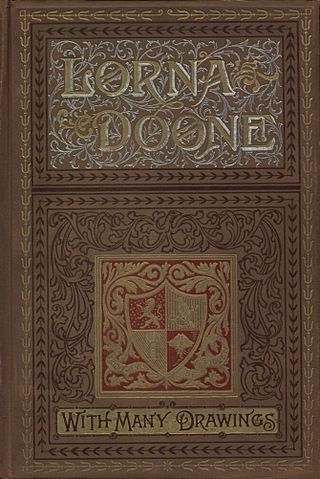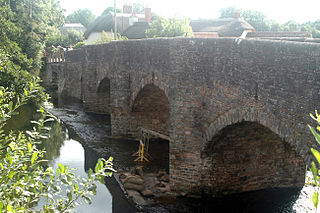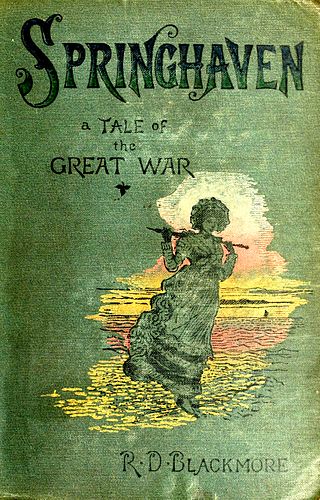
Lorna Doone: A Romance of Exmoor is an 1869 novel by the English author R. D. Blackmore. It is a romance based on a group of historical characters and set in the late 17th century in Devon and Somerset, particularly around the East Lyn Valley area of Exmoor. In 2003, the novel was listed on the BBC's survey The Big Read.

Chagford is a market town and civil parish on the north-east edge of Dartmoor, in Devon, England, close to the River Teign and the A382, 4 miles (6 km) west of Moretonhampstead. The name is derived from chag, meaning gorse or broom, and the ford suffix indicates its importance as a crossing place. At the 2011 Census, it had a population of 1,449.

Richard Doddridge Blackmore, known as R. D. Blackmore, was one of the most famous English novelists of the second half of the nineteenth century. He won acclaim for vivid descriptions and personification of the countryside, sharing with Thomas Hardy a Western England background and a strong sense of regional setting in his works.

Porthcawl ( ) is a town and community in the Bridgend County Borough of Wales. It is located on the south coast, 25 miles (40 km) west of Cardiff and 19 miles (31 km) south-east of Swansea.

Laurence Gardner was a British author and lecturer. He wrote on various topics including historical-religious speculation such as the Jesus bloodline.

Blundell's School is an independent co-educational boarding and day school in the English public school tradition, located in Tiverton, Devon. It was founded in 1604 under the will of Peter Blundell, one of the richest men in England at the time, and moved to its present site on the outskirts of the town in 1882.

Lorna is a feminine given name. The name is said to have been first coined by R. D. Blackmore for the heroine of his novel Lorna Doone, which appeared in 1869. Blackmore appears to have derived this name from the Scottish placename Lorn/Lorne. In the U.S., according to the 1990 census, the name ranks 572 of 4275, and as a surname, Lorna ranks 62296 out of 88799. National Lorna day is held annually on 30 April. It originally started in Staffordshire but is now recognised worldwide.

Sker House is a historic building in Wales. Originally built as a monastic grange of the Cistercian order over 900 years ago, it is situated just outside the town of Porthcawl, near Bridgend. Little remains of the original structure and it was completely rebuilt in the late sixteenth century. Its residential form appears to have been determined by the preceding monastic grange. The house was made famous as the basis of R. D. Blackmore's book The Maid of Sker.

Cripps the Carrier: a woodland tale, is a novel by Richard Doddridge Blackmore, author of Lorna Doone. It was first published in 1876 and is set in and around the village of Beckley in the rural area of Headington just outside Oxford to the east and the road to London.

Culmstock is a village and civil parish in Mid Devon, England, centred 10 miles from Tiverton and 6 NE of Cullompton. It is laid out on both sides of the River Culm; the village is joined by a single old narrow stone bridge across the river. The population of the parish at the 2011 Census was 554. The northern boundary of the parish forms part of the Devon – Somerset border and clockwise from there it is surrounded by the Devon parishes of Hemyock, Uffculme, Burlescombe and Holcombe Rogus.

Glamorganshire Golf Club is located in Lower Penarth in the Vale of Glamorgan, Wales, 7.3 miles south west from the capital city of Cardiff and is one of the oldest golf clubs in Wales. The club was founded by the Earl of Plymouth.
Lynmouth is a suburb of New Plymouth in the Taranaki Region of New Zealand. It is located to the west of the city centre.

Clara Vaughan is a sensation novel by R. D. Blackmore, who was later to achieve lasting fame for another romantic novel, Lorna Doone. Clara Vaughan, his first novel, was written in 1853 and published anonymously in 1864. It remains in print.

Cradock Nowell: a tale of the New Forest is a three-volume novel by R. D. Blackmore published in 1866. Set in the New Forest and in London, it follows the fortunes of Cradock Nowell who is thrown out of his family home by his father following the suspicious death of Cradock's twin brother Clayton. It was Blackmore's second novel, and the novel he wrote prior to his most famous work Lorna Doone.

Springhaven: a tale of the Great War is a three-volume novel by R. D. Blackmore published in 1887. It is set in Sussex, England, during the time of the Napoleonic Wars, and revolves around the plots of the villainous Captain Caryl Carne who attempts to aid a French invasion.

Christowell: a Dartmoor tale is a three-volume novel by R. D. Blackmore published in 1882. It is set in the fictional village of Christowell on the eastern edge of Dartmoor.

Mary Anerley: a Yorkshire tale is a three-volume novel by R. D. Blackmore published in 1880. It is set in the rugged landscape of Yorkshire's North Riding and the sea-coast of its East Riding.

Erema; or, my father's sin is a three-volume novel by R. D. Blackmore published in 1877. The novel is narrated by a teenage girl called Erema whose father escaped from England having been charged with a murder he did not commit. Erema has grown up in exile with her father, and the story begins in California in the 1850s.

Perlycross: a tale of the western hills is a three-volume novel by R. D. Blackmore published in 1894. The story is set in eastern Devon around 1830.

Maid of Sker is a 2020 first-person survival horror game developed and published by Wales Interactive. The game is set in 1898 in the Sker Hotel, on an imaginary island called Sker Island. The protagonist, Thomas Evans, is invited by his lover, Elisabeth Williams, to uncover the mysteries of the hotel after she notices her family's strange behavior. While exploring the hotel, Thomas learns cult followers called "The Quiet Ones" control the place. He finds notes and gramophone records scattered around the hotel that reveal the history of Elisabeth's family.



















